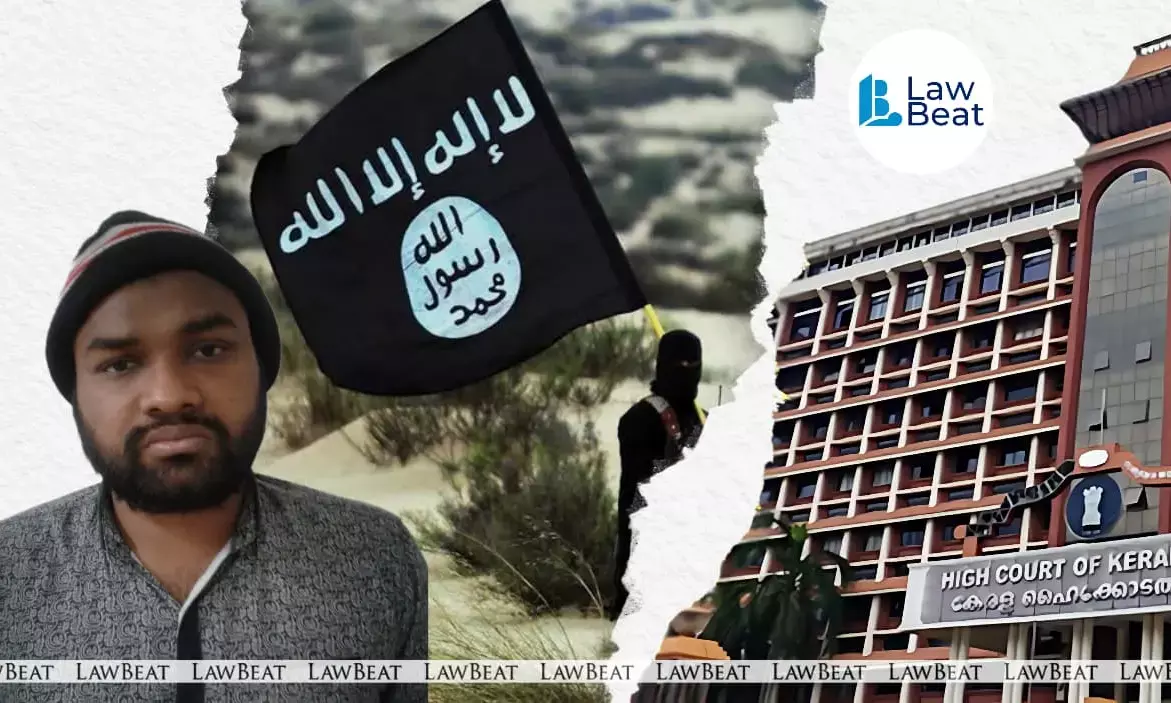Kerala High Court Upholds Conviction of ISIS Recruit, Reduces Life Term to 10 Years

The Kerala High Court on August 14, 2025, upheld the conviction of Subahani Haja alias Abu Jasmine, a 39-year-old man, for offences linked to his association with the Islamic State (ISIS) and attempts to procure explosive materials in India. However, court modified the life sentence awarded under Section 20 of the Unlawful Activities (Prevention) Act to rigorous imprisonment for 10 years.
The division bench of Justice Raja Vijayaraghavan V and Justice K.V. Jayakumar dismissed Haja's appeal and affirmed the 2020 judgment of the Special Court for NIA cases, Ernakulam. The division bench, though, accepted the Special Court’s factual findings, but it modified the quantum of punishment after weighing mitigating factors.
The prosecution’s case, accepted by the trial court and sustained by the High Court, was that Subahani Haja, also known as Abu Jasmine, was 35 when he set out to join the Islamic State (ISIS) in 2015. Drawn to the group’s activities in Iraq, he travelled on a tourist visa to Istanbul, hid his real intentions from his family, and then slipped across the Turkish border into Mosul. There, ISIS gave him religious and arms training before sending him to the war front.
His stint as a fighter was short-lived. An injury during training left him unfit for battle, and despite repeated pleas to return home, ISIS first put him on guard duty and later threw him into jail. Eventually abandoned on a street, he managed to arrange money for a flight and returned to India in September 2015.
Back home, Subahani worked as a salesman in Tamil Nadu for about a year, but his ties with ISIS had not ended. He sought to procure explosive precursor chemicals from Sivakasi as part of preparations to manufacture bombs. Acting on specific intelligence, the National Investigation Agency (NIA) raided his residence in Kadayanellur in October 2016. He was arrested on October 5, 2016.
Investigating officers recovered multiple electronic devices and documents during searches, including mobile phones, a computer hard disk and apparel. Cyber-forensic extractions of Gmail and social-media accounts recorded searches and messages indicating support for ISIS and explicit enquiries about joining and reaching Iraq. Forensic analysis of jackets and sweaters seized from the Haja’s residence detected potassium chlorate and potassium nitrate, chemicals the FSL report described as ingredients used for explosives, and found fiber disturbances possibly caused by carrying hard objects. These materials, together with travel and banking records showing use of cards and flight manifests, formed the core of the prosecution’s documentary case.
The case also rested on witness testimony, notably that of an approver (PW34) who described the accused’s communications and movement, and expert evidence from C-DAC and forensic laboratories regarding digital extractions and material analysis.
The trial court had convicted Haja under Sections 120B (criminal conspiracy), 125 (waging war), and provisions of the UA(P) Act (Sections 20, 38 and 39); he was acquitted on Section 122 IPC. The Special Court originally imposed life imprisonment under Section 20 UAPA along with other concurrent terms.
On appeal, Subahani’s counsel contended he was falsely implicated, that electronic evidence was planted or fabricated, and that his Turkey trip was not to join ISIS.
The High Court examined these contentions, considered the digital and material evidence, and endorsed the trial court’s assessment that the prosecution had proved the elements of conspiracy and membership/support of a proscribed organisation beyond reasonable doubt. However, the bench acknowledged mitigating circumstances like his age at the time of offending, absence of overt post-return acts beyond an unsuccessful attempt to obtain precursors, absence of antecedents and the possibility of reformation, and concluded that the Special Court had not adequately recorded reasons for imposing the maximum sentence under Section 20. The court therefore reduced the life sentence under Section 20 to ten years’ rigorous imprisonment, while upholding the remainder of the convictions and concurrent sentences.
Case Title: Subahani Haja @ Abu Jasmine vs. UOI
Judgment Date: August 14, 2025
Bench: Justice Raja Vijayaraghavan V and Justice K.V. Jayakumar
